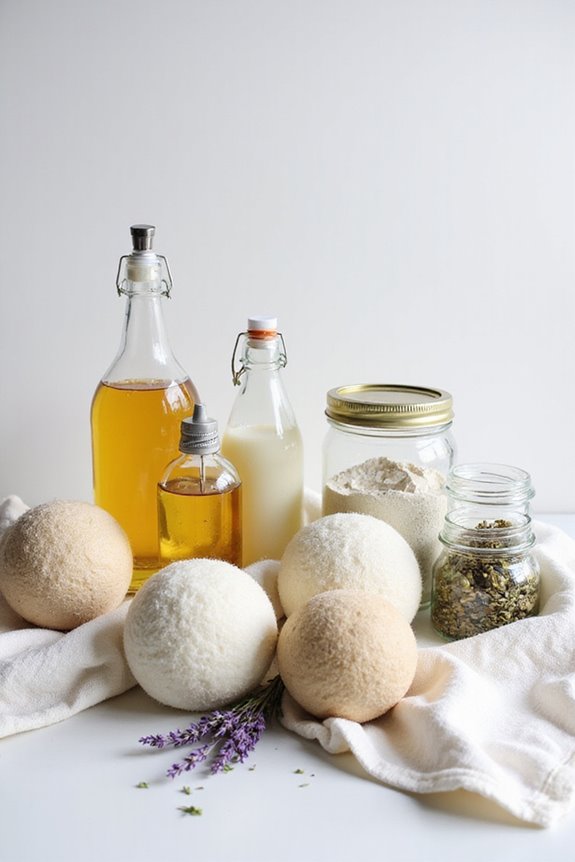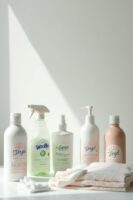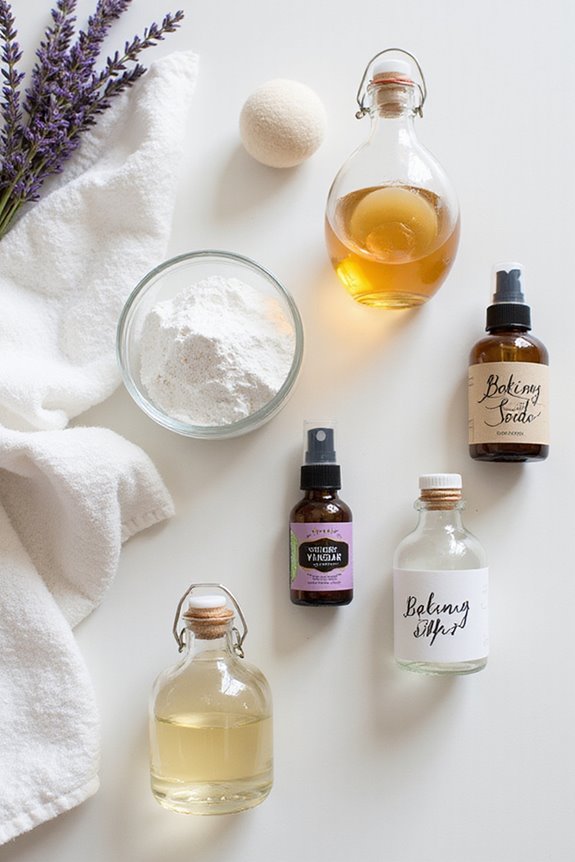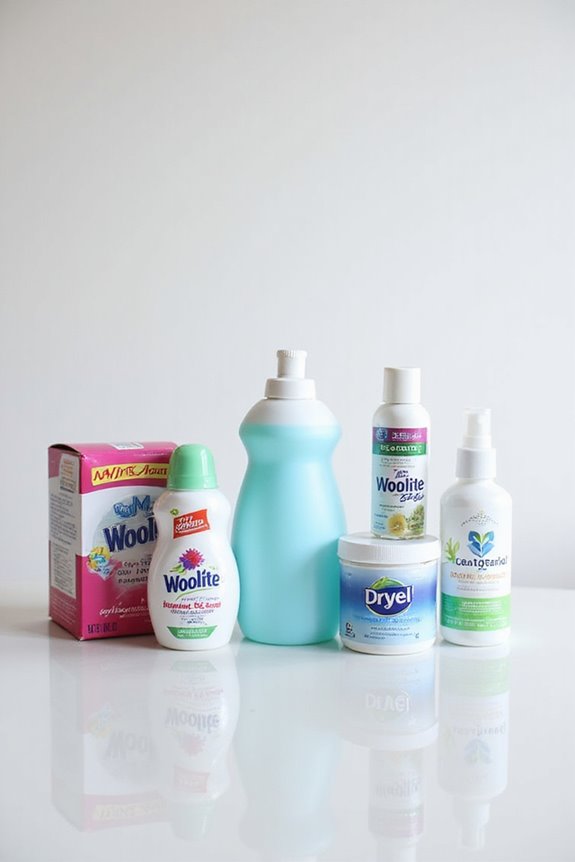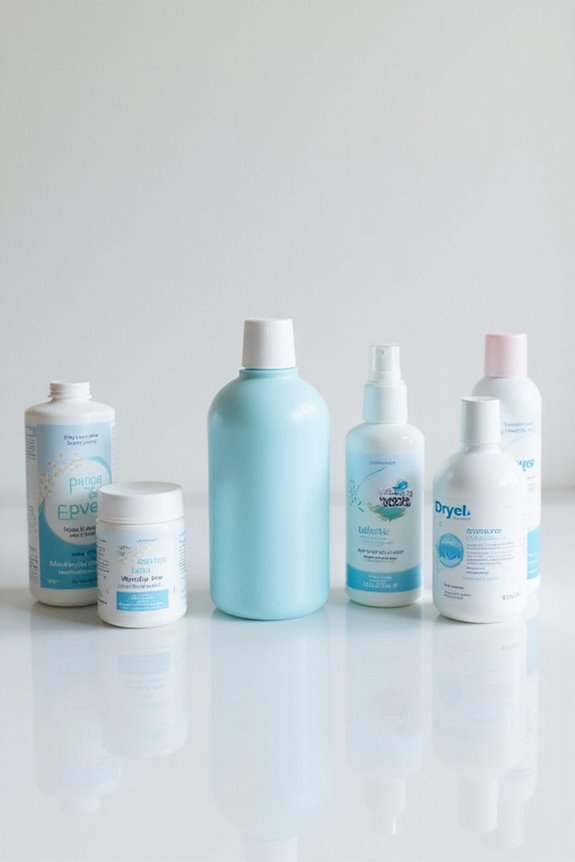We can switch to natural alternatives for fabric softener without sacrificing softness. Wool dryer balls are fantastic; they cut drying time and last for over 1,000 loads. White vinegar is another winner—it’s great at neutralizing odors and doesn’t leave that vinegar smell behind. Plus, baking soda softens fabrics and keeps colors bright. And if you get crafty, DIY reusable dryer sheets are a fun option too! Stick around, and we’ll explore these eco-friendly choices even more.
Key Takeaways
- Wool dryer balls are a natural, reusable alternative that reduce drying time and static cling without damaging fabrics.
- White vinegar acts as a natural fabric softener, neutralizing odors and cleaning washing machines without harsh chemicals.
- Baking soda softens fabrics and maintains color brightness while enhancing freshness and tackling mild stains.
- DIY reusable dryer sheets made from cotton can be soaked in vinegar and essential oils for a customizable, eco-friendly option.
- Natural alternatives minimize environmental impact by avoiding petroleum-based ingredients and reducing microplastic pollution.
Wool Dryer Balls: An Eco-Friendly Choice
When it comes to doing laundry, we often think about fabric softeners, but have you ever considered using wool dryer balls instead? These little wonders are made from 100% natural wool, which means they’re biodegradable and sustainable. One of the best wool benefits is their ability to absorb moisture, improving drying efficiency. They can actually cut drying time by up to 25%! Plus, they’re soft on fabrics, so you don’t have to worry about damaging delicate items. Unlike chemical softeners, they won’t leave behind any residue or affect fabric absorbency. We’ve found they also reduce static cling naturally, and you can even add a few drops of essential oils for a lovely scent. It’s a win-win! Additionally, wool dryer balls are reusable for over 1,000 loads, making them a cost-effective alternative to disposable dryer sheets.
The Benefits of White Vinegar as a Fabric Softener
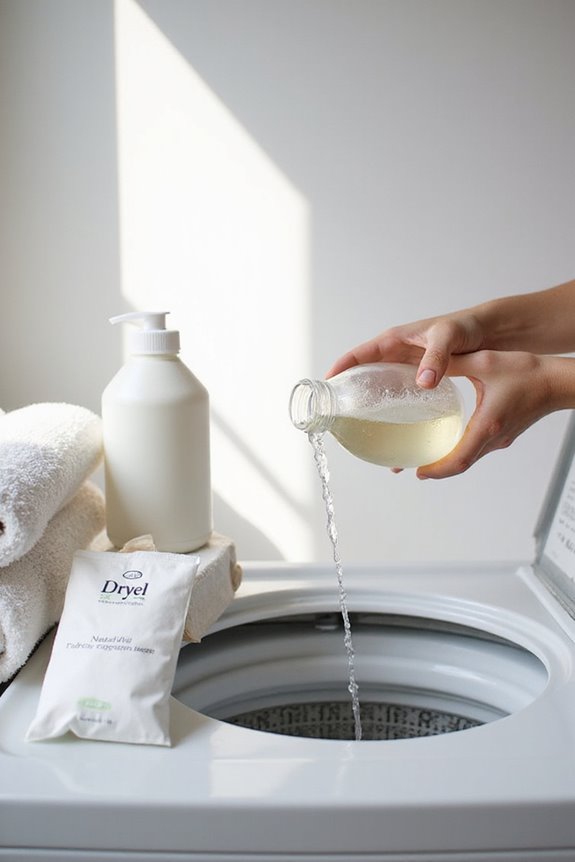
Many of us might not think about white vinegar as a laundry hero, but it’s time we change that perspective! This natural fabric softener offers fantastic vinegar benefits that go beyond just softening. By adding 1/4 to 1/2 cup during the rinse, we can enjoy laundry freshness without harsh chemicals. It tackles odor like a pro, neutralizing smells from sweat or pets, without leaving a vinegar scent behind. Plus, it keeps our washing machines clean by removing soap residues, preventing buildup that could harm our machines. And for those with sensitive skin or allergies, it’s a gentle alternative to commercial softeners. Additionally, using vinegar can help ensure our laundry remains residue-free and free from common irritants. So, let’s embrace white vinegar and put it to work in our laundry routines!
Using Baking Soda for Softer Fabrics
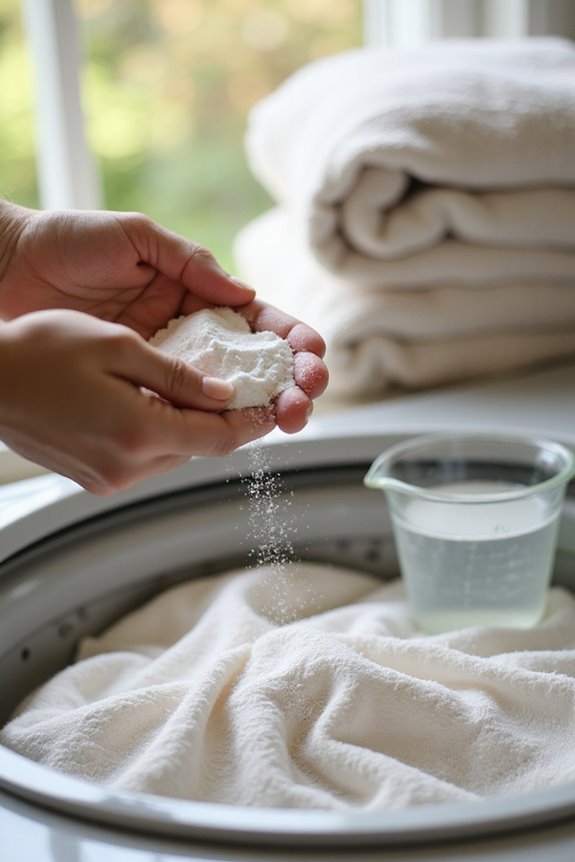
After discovering the wonders of white vinegar in our laundry routines, it’s time to introduce another powerhouse: baking soda. This natural fabric softener works its magic by neutralizing pH levels in the wash water, making our clothes feel softer and smoother. Plus, it helps maintain color brightness without leaving behind any chemical residues.
For best results, we should add 1/4 to 1/2 cup of baking soda directly into the washing drum. It’s versatile, tackling odors and mild stains while boosting our detergent’s effectiveness. Just a heads-up—let’s avoid using it on delicate fabrics without testing first. With these laundry tips, we can enjoy fresher, softer clothes while being kind to our skin and the planet!
DIY Homemade Reusable Dryer Sheets
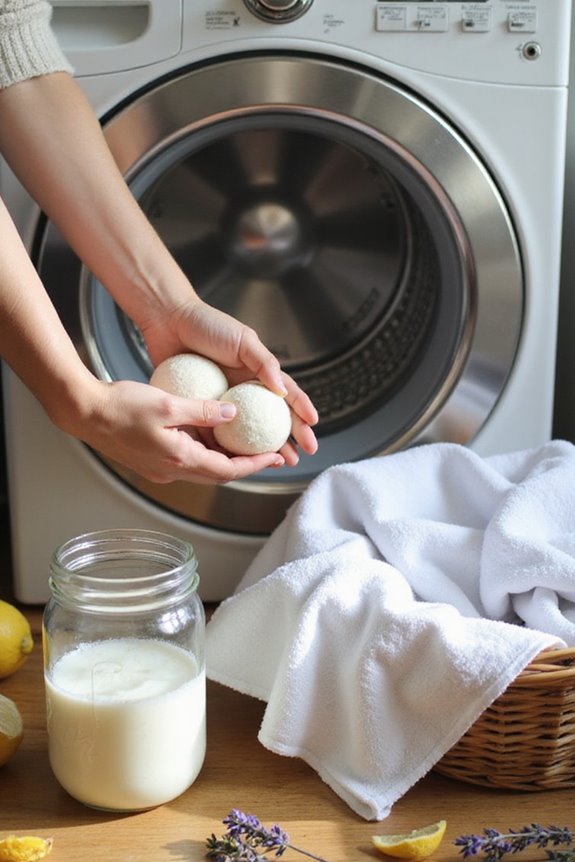
Creating our own reusable dryer sheets can be a fun and eco-friendly way to soften fabrics and reduce static cling. We can use materials like old cotton T-shirts or dishcloths for this project. First, we’ll cut the fabric into 10-inch squares, then soak them in a mix of distilled vinegar, water, and our favorite essential oils for homemade scents. If we want extra softness, a bit of hair conditioner can be added too. After soaking, we store the fabric in a sealable glass jar. When it’s laundry time, just toss one in the dryer! These reusable materials not only save money but also keep our clothes fresh without harmful chemicals. Plus, we can switch up scents whenever we like! Additionally, using eco-friendly materials in our DIY sheets supports sustainability and reduces environmental impact.
The Magic of Adding Towels to Your Dryer
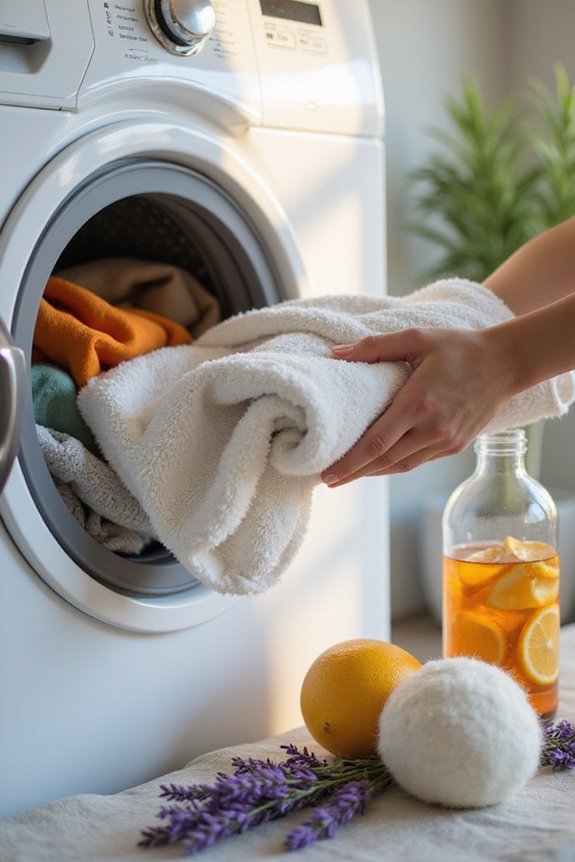
Using DIY reusable dryer sheets is a great way to keep our clothes fresh, but there’s another simple trick that’s just as effective: adding towels to the dryer. The towel benefits are impressive! When we toss in a couple of dry towels with our wet clothes, they absorb moisture and speed up drying efficiency. Plus, towels help redistribute heat and reduce static cling, keeping our clothes from sticking together. They even soften fabrics as they tumble. We’ve found that one or two standard bath towels do the trick. Just be sure not to mix heavy towels with delicate items. With this method, we can enjoy softer, fluffier laundry while cutting down on chemicals and saving energy—who knew laundry could be this easy?
Environmental Impact of Traditional Fabric Softeners
When we think about laundry day, many of us don’t realize that traditional fabric softeners can have a big impact on the environment. These products often contain petroleum-based ingredients that don’t break down easily, contributing to environmental pollution. Not to mention, the artificial fragrances can irritate our skin and worsen respiratory issues.
When we wash our clothes, tiny microplastics escape into waterways, harming marine life. Plus, those chemicals can create “dead zones” in our water bodies, which sounds pretty scary!
Let’s not forget about air quality—volatile organic compounds released during washing can affect our health. So, while we want our clothes to smell nice, we should think about the bigger picture and consider natural alternatives that are kinder to our planet. Many of these alternatives are made with plant-based ingredients and are designed to be safe for both fabrics and the environment.
How Natural Alternatives Improve Fabric Longevity
After learning about the environmental impact of traditional fabric softeners, it’s time to explore how natural alternatives can actually help our clothes last longer. By using fiber preservation techniques like wool dryer balls, we can reduce drying time and heat, which minimizes damage to our fabrics. Natural cleaning agents, such as vinegar, condition our clothes while removing detergent residues that can make fibers stiff. Baking soda balances pH levels, protecting fabrics from harsh alkalinity. Plus, these alternatives help maintain color vibrancy and prevent pilling, keeping our clothes looking fresh. With less exposure to chemicals, we can extend the life of our favorite garments, making laundry day feel a little less challenging and a lot more rewarding! Additionally, baking soda is praised for its deodorizing properties, ensuring our clothes smell fresh without the need for synthetic fragrances.
Cost-Effectiveness of Natural Fabric Softeners
Natural fabric softeners can be a game-changer for our wallets and our laundry routines. When we compare costs, homemade softeners like vinegar and baking soda are remarkably cheaper than store-bought options. Plus, we can add essential oils without breaking the bank!
DIY solutions keep those ongoing expenses low since we won’t need to buy pricey chemical products. Reusable dryer sheets also extend our savings—just think of all those single-use sheets we won’t need.
While some commercial brands, like Seventh Generation, offer natural options, their prices can be higher. Still, a savings analysis shows we save in the long run by avoiding skin irritations and prolonging our clothes’ lifespan. In the end, natural fabric softeners are a smart choice for our budget! Additionally, using eco-friendly ingredients contributes to a healthier environment, making this choice even more beneficial.
Frequently Asked Questions
Can Natural Fabric Softeners Cause Allergic Reactions?
Yes, natural fabric softeners can cause allergic reactions. They may contain allergy triggers like essential oils that irritate skin sensitivity. It’s important for us to test products carefully and choose hypoallergenic options to minimize risks.
How Do I Choose the Best Natural Alternative?
Choosing the best natural alternative’s like steering through a garden; we must consider cost effectiveness and our unique preferences. Let’s explore options together, finding the right blooms to create a soft, eco-friendly laundry experience.
Are Natural Fabric Softeners Safe for All Fabric Types?
When it comes to safety concerns, most natural fabric softeners are safe for various fabric types, especially natural fibers. We should always check specific care instructions for delicate or synthetic materials to guarantee ideal results.
How Do Natural Alternatives Compare in Scent Longevity?
As we ponder scent intensity and fragrance duration, we find natural alternatives offer fleeting aromas. While they soften fabrics, their scents often vanish quickly, leaving us to refresh them frequently for a more enduring fragrance experience.
Can I Use Multiple Natural Softeners Together?
Yes, we can definitely use multiple natural softeners together! By employing combination techniques, we enhance effectiveness comparison, targeting different fabric stiffness causes, ensuring our laundry feels soft, fresh, and chemical-free. Let’s experiment with these natural options!

